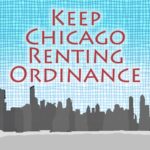 So, we’ve discussed notices, relocation assistance/rent control, and registration as we broke down the Keep Chicago Renting Ordinance. Today, we will wrap things up by addressing the various ways the law allows for compliance and, more directly, non-compliance.
So, we’ve discussed notices, relocation assistance/rent control, and registration as we broke down the Keep Chicago Renting Ordinance. Today, we will wrap things up by addressing the various ways the law allows for compliance and, more directly, non-compliance.
No Waiver. It is important to note that at 5-14-080, the ordinance prohibits any owner from getting a tenant to agree to waive or forego any rights or remedies under the ordinance in any rental agreement entered into or offered to a tenant. Further, any provision in a rental agreement seeking to waive or forego rights and remedies is unenforceable. The City is shutting the door on owners who might want to negotiate away these rights in a lease.
Tenant Enforcement. Section 5-14-070 provides that Tenants have a right to bring a private cause of action (lawsuit) against an owner to seek an owner’s compliance with 5-14-040 (notice) and 5-14-050 (relocation assistance). In addition to any remedy available under those provisions, a prevailing tenant is also entitled to recover damages and reasonable attorney’s fees. So, in addition to the specific remedies allowed, a tenant can claim any other actual damages, and can get a judgment for their attorney’s fees. This kind of fee-shifting when it comes to legal fees is what will get tenant’s rights attorneys excited about these cases and that’s precisely what the City is going for when they enact such a provision. A tenant does not have a private cause of action for a violation of 5-14-060 (registration). The enforcement of that one belongs to the City.
City Enforcement. The City can also get in on the action. First, 5-14-090 provides that the Commissioner of the Department of Buildings and the Commissioner of Business Affairs and Consumer Protection shall jointly have the right to administer the law and adopt further regulations related to the law. The law enables either department to enforce any provision of the law by way of an action with the City’s Department of Administrative Hearings or by the City’s corporation counsel by way of lawsuit.
Penalties. To really give some teeth to the law, as if there was not enough already, the law provides that any person found guilty of violating the law or any regulation adopted by the Commissioners shall be “fined not less than $500 nor more than $1000”. Additionally, each failure with respect to each person shall be considered a separate offense (ie. if there are two owners, they could each owe the fine). Finally, each day a violation exists shall be considered a separate and distinct offense (ie. fail to give the required notice for 10 days and you have 10 offenses!). Further, all liability for violations is “joint and several”.
Everybody’s Liable. The real coup de grace of the ordinance is that when any violation is committed by a corporation, all officers and directors “who may be responsible for any violation of this chapter shall, except as otherwise specifically prohibited or negated by law, be liable as provided in Section 1-4-090(e) of the City’s Code for all fines, fees, and penalties imposed on the corporation…”
What is 1-4-090(e) of the Chicago Municipal Code? The code reads as follows:
1-4-090(e) “Person” means any natural individual, firm, trust, partnership, association, joint venture, corporation or other legal entity, in his or its own capacity or as administrator, conservator, guardian, executor, trustee, receiver or other representative appointed by the court. Whenever the word “person” is used in any section of this code prescribing a penalty, fine, or cost recovery action as applied to partnerships, associations or joint ventures, the word shall include the members thereof, and as applied to corporations shall include the officers, agents or employees thereof who intentionally, recklessly or negligently cause or allow any violation of the section;
So, basically, this means, in some circumstances, there can be liability on the part of a limited partnership, corporation, or LLC.
Conclusion. If you are still with me, the reading of this law is clear. The City wants compliance. They’ve put together a toolkit of enforcement remedies so that private tenants or the City can obtain compliance. Anyone interested in bidding on a foreclosure property needs to have a firm understanding of this law and the possible major consequences of failure to comply!

So this is in effect for all future foreclosures that are purchased
If you already own them and the tenants vacated it doesnt apply?
Does it aplly to single family as well as multi?
This is for foreclosures purchased at auction – not for the “second” owner after the foreclosure. It does apply to single and multi-family rental properties in the City.
I bought the building (not foreclosed) and after two months of owning it, gave the tenant a 60 day notice as the tenant has been without a lease for 2 years. After they did not move, I gained order for possession. The day the judge ruled, the tenant filed a civil suit against me for not giving them enough time to move and mentioned “bought from owner who was in foreclosure” in the tenant’s Complaint. Is a signed HUD 1 and a signed deed enough to prove it was not a foreclosure purchase?
It would certainly be strong evidence in your favor. Inasmuch as I haven’t seen the tenant’s complaint or your paperwork and I do not know the circumstances surrounding your purchase of the property, I can’t really say for certain.